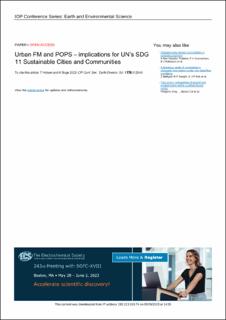Urban FM and POPS – implications for UN's SDG 11 Sustainable Cities and Communities
Peer reviewed, Journal article
Published version
Permanent lenke
https://hdl.handle.net/11250/3069305Utgivelsesdato
2023Metadata
Vis full innførselSamlinger
Originalversjon
IOP Conference Series: Earth and Environmental Science (EES). 2023, 1176 . 10.1088/1755-1315/1176/1/012040Sammendrag
Urban FM (UFM) is usually understood as micro level Facility Management (FM) methods and tools applied on macro level challenges in communities and neighborhoods in urban areas, among others to improve the citizens' well being. UFM is also often associated with smart cities, technology, and UN's SDGs. However, many studies of UFM overlook property rights and other institutional matters that establish many of the ground rules. Property rights are frequently understood as a bundle of rights, i.e., the right of use (USUS), the right of enjoyment (USUS FRUCTUS), and the right of disposition (ABUSUS). UFM usually takes place across property boundaries, on properties with disparate bundles of rights, including restrictions through public zoning. Many urban transformation projects have established privately owned public spaces (POPS), leading to a restructured division of responsibilities between public authorities and private owners in the management, design, access control, and use of urban public spaces. This paper investigates whether and under which conditions UFM and management of POPS can contribute to realization of UN's SDG 11 Sustainable Cities and Communities, hereunder to facilitate development of inclusive, safe, robust, and sustainable cities and local communities. Urban FM and POPS – implications for UN's SDG 11 Sustainable Cities and Communities
